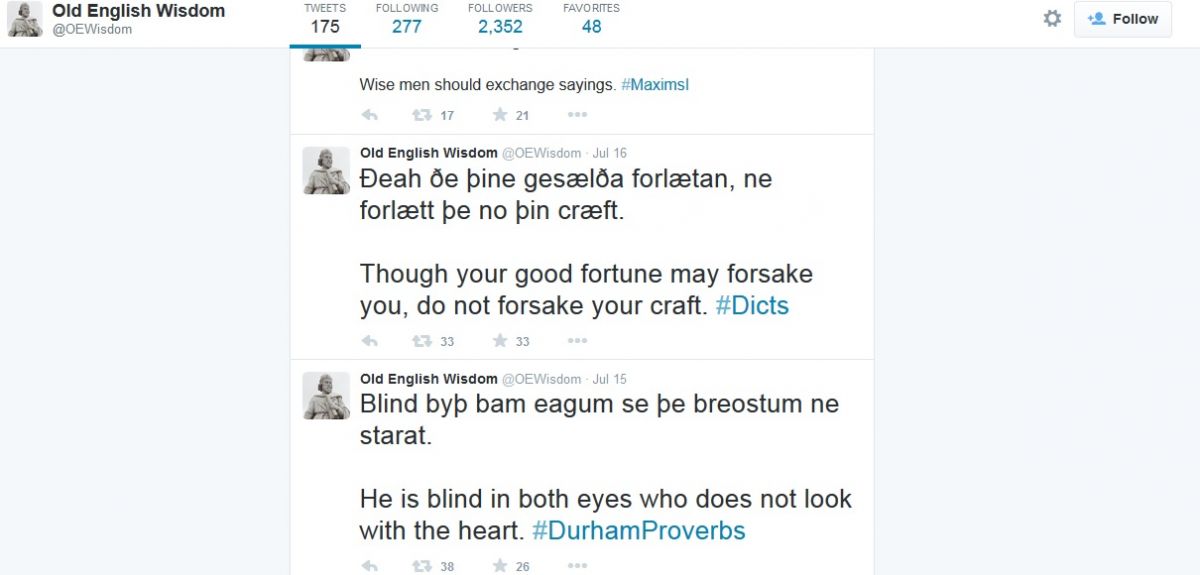
Tweeting in Old English
An expert in Old English at Oxford is sharing Anglo-Saxon wisdom on Twitter – and the pithy thousand-year-old advice is proving popular with a new audience.
Dr Eleanor Parker, a Mellon Postdoctoral Fellow based at TORCH | The Oxford Research Centre in the Humanities, studies literature produced in England during the eleventh and twelfth centuries and teaches Old English and Old Norse.
She began tweeting lines from Anglo-Saxon literature in May and has since picked up a loyal following of nearly 2,500 people.
Dr Parker says: 'I'm intrigued by how well this ancient tradition seems to work within the brand-new medium of Twitter, when they are (except in their fondness for brevity) almost exact opposites: Twitter thrives on the knee-jerk reaction and the swift reply, while wisdom literature is a genre which grows slowly, out of years, lifetimes, and centuries of human experience.
'But what medium and message have in common is the idea that something of value deserves to be shared: Gleawe men sceolon gieddum wrixlan, one poem famously says, "Wise men should exchange sayings".'
Dr Parker has quoted from sources including Beowulf, Alfred the Great, and a collection of proverbs held in Durham Cathedral.
'Some of the texts I'm quoting from are dedicated collections of proverbs and maxims, in poetry or prose, while some are single instances from longer texts; some are translations or versions of Latin texts, others have no known source; some are paralleled in later medieval English proverbs, some in other languages such as Old Norse,' she says.
'Some are so culturally specific that they may seem to offer nothing more to a modern audience than a historical curiosity. But others have much to say about subjects which are timeless: friendship, love and family; the right and wrong ways to use speech, strength, skill or knowledge; how to teach and how to learn; the experience of grief, loneliness, joy, and companionship; the value of patience, self-restraint, loyalty, and a generous heart.
'They celebrate both the riches which can be learned from books and the wisdom which can be earned through the simple act of living.'
Some of the proverbs are timeless pieces of advice which would not look out of place in a modern newspaper's 'Agony Aunt' column. The following come from the Durham Proverbs in Durham Cathedral:
Geþyld byþ middes eades.
Patience is half of happiness.
Æt þearfe mann sceal freonda to cunnian.
In time of need, a man finds out his friends.
Ne sceal man to ær forht ne to ær fægen.
One should not be too soon fearful nor too soon joyful.
Seo nydþearf feala læreð.
Necessity teaches many things.
Hwon gelpeð, se þe wide siþað.
Little boasts the one who travels widely.
But not all are as easy to apply in the 21st Century…
Ne mæg man muþ fulne melewes habban and eac fyr blawan.
No one can have a mouth full of flour and also blow on a fire.
Nu hit ys on swines dome, cwæð se ceorl sæt on eoferes hricge.
It's up to the pig now, said the man sat on the boar’s back.
Readers can follow @OEWisdom on Twitter and read more about the project on Dr Parker’s blog.